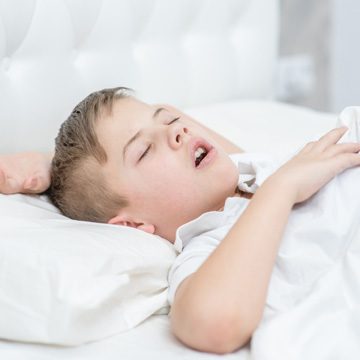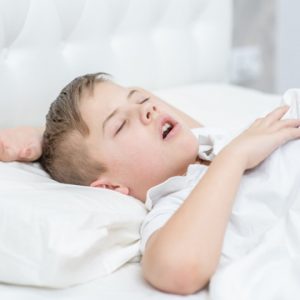
 San Francisco, Marin, and Oakland, CA
San Francisco, Marin, and Oakland, CA
It might seem cute when your child snores while sleeping, but frequent, audible snoring is not normal behavior in a child. In fact, loud snoring is one of the major identifiable symptoms of obstructive sleep apnea, a serious sleep breathing disorder that can have major consequences on one’s health. Glen Park Dental has found success in treating children with sleep apnea in San Francisco through myofunctional therapy.
Here’s what happens during a sleep apnea attack
If your child has sleep apnea, he or she experiences difficulty breathing when lying down to sleep. These difficulties often cause total interruptions in breathing. Even if these disruptions only last a second or two, they are significant enough to lower oxygen levels and cause the brain to send signals to the body to wake it up enough for normal breathing to resume. A patient with sleep apnea might never consciously realize they are awake, but each attack disrupts the sleep cycle, depriving your child of the vital physical and mental restoration that occurs during the deepest stage of sleep. Someone with an advanced case of sleep apnea may experience hundreds of these attacks per hour, so imagine what that does to their ability to get a good night’s rest!
There can be several main causes of the airway problems that lead to sleep apnea:
- A collapse of soft tissue in the throat
- The tongue sliding back into the airway, because there is not enough room to accommodate it in the mouth
- The tonsils or adenoids being abnormally large, restricting air flow
Your child can be more susceptible to developing sleep apnea if he or she already has a narrow airway. Airway development can be hindered if your child regularly breathes through the mouth. Not only is mouth breathing an inefficient method of breathing that actually makes it harder for your body to absorb the proper amounts of oxygen, but also mouth breathing can have a host of other health consequences. Click here to learn more about the potential dangers of mouth breathing.
How can myofunctional therapy help your child overcome their sleep apnea?
Myofunctional therapy is an increasingly popular method of treatment for sleep apnea. A course of myofunctional therapy consists of exercising the muscles of the mouth and tongue. Myofunctional exercises usually are simple enough to complete in a matter of minutes and can be completed with minimal discomfort.
An increasing body of medical research suggests that myofunctional therapy benefits in helping patients with sleep apnea. Patients who have undergone a course of therapy along these lines drops severe cases of sleep apnea down to mild or moderate levels, while also significant decreases in the prevalence of both snoring and daytime fatigue.
Why should you consider myofunctional therapy as a method for sleep apnea treatment?
Myofunctional therapy is minimally invasive, especially to other types of treatment for sleep apnea. The patient can perform the exercises at home on a daily basis and should experience little discomfort while doing so. Under the supervision of a licensed myofunctional therapist, a course of myofunctional therapy serves to re-train the orofacial system. One of the goals of myofunctional therapy is to achieve the ideal rest oral posture: lips together, teeth together, and the tongue resting comfortably against the roof of the mouth. This rest oral posture encourages nasal breathing, which is recommended and more beneficial than mouth breathing. This method of breathing also creates more room in the mouth for the tongue and can strengthen the muscles of the throat, removing two of the most common causes for the airway issues that lead to sleep apnea. Furthermore, when children undergo myofunctional therapy, achieving the ideal rest oral posture helps guide future facial development and can help widen the airway to prevent future incidents of sleep apnea.
Certified Myofunctional Therapist in the Bay Area
If your child is suffering from sleep apnea, he or she needs to be diagnosed and treated by an experienced medical professional. One of the sleep apnea dentists in the Bay Area at Glen Park Dental can help your child get the lasting rest he or she needs. Call (415) 585-1500 to schedule a consultation.
Glen Park Dental is proud to serve our patients in Marin, Oakland, and San Francisco, California.


